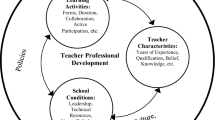Abstract
Practicing teachers in high-SES and low-SES communities completed a survey that assesses the strength of teachers’ support for professional development (PD), with the goal of determining the extent to which PD initiatives in low-SES communities face obstacles not evident in more affluent areas (N = 150). A multiple regression analysis was conducted on the factor scores produced by the survey, Teachers’ Attitudes about Professional Development (TAP). Support for PD was higher in high-SES communities than low-SES ones, and higher among elementary teachers than secondary teachers in both communities. To the extent that teachers’ attitudes about PD influence the effectiveness of PD initiatives, these attitudes present difficulties in low-SES communities beyond those evident in high-SES areas. Needed are professional-development models, and research that tests them, to determine how best to overcome obstacles that teachers’ attitudes likely cause in PD initiatives in low-SES communities.
Similar content being viewed by others
References
Amos, N., & Benton, G. (1988). Teacher attitudes toward staff development and related activities in a rural educational consortium. Paper presented at the annual meeting of the Mid-South Educational Research Association.
Birman, B. F., Desimone, L., Porter, A. C., & Garet, M. S. (2000). Designing professional development that works. Educational Leadership, 57, 28–33.
Borko, H. (2004). Professional development and teacher learning: Mapping the terrain. Educational Researcher, 33, 3–15. doi:10.3102/0013189X033008003.
Cochran-Smith, M., & Lytle, S. L. (1992). Communities for teacher research: Fringe or forefront? American Journal of Education, 100, 298–325. doi:10.1086/444019.
Craft, A. (1996). Continuing professional development. London: Open University.
Darling-Hammond, L. (2005). A good teacher in every classroom: Preparing the highly qualified teachers our children deserve. San Francisco: Jossey-Bass.
Darling-Hammond, L., & McLaughlin, M. (1995). Policies that support professional development in an era of reform. Phi Delta Kappan, 76, 597–604.
Garet, M., Porter, A., Desimone, L., Birman, B., & Yoon, K. S. (2001). What makes professional development effective? Results from a national sample of teachers. American Educational Research Journal, 38, 915–945. doi:10.3102/00028312038004915.
Guskey, T. (2000). Evaluating professional development. Thousand Oaks, CA: Corwin.
Guskey, T. (2002). Professional development and teacher change. Teachers and Teaching: Theory and Practice, 8, 381–391. doi:10.1080/135406002100000512.
Haney, J. J., Czerniak, C. M., & Lumpe, A. T. (1996). Teacher beliefs and intentions regarding the implementation of science education reform strands. Journal of Research in Science Teaching, 33, 971–993. doi:10.1002/(SICI)1098-2736(199611)33:9<971::AID-TEA2>3.0.CO;2-S.
Howe, A., & Stubbs, H. (1997). Empowering science teachers: A model for professional development. Journal of Science Teacher Education, 8, 167–182. doi:10.1023/A:1009487417488.
Killion, J., & Hirsh, S. (2001). Continuous learning: Top-quality professional development is key to teacher effectiveness. The American School Board Journal, 188, 36–38.
Little, J. W. (1993). Teachers’ professional development in a climate of educational reform. Educational Evaluation and Policy Analysis, 15, 129–151.
Little, J. W. (2001). Professional development in pursuit of school reform. In A. Lieberman & L. Miller (Eds.), Teachers caught in action: Professional development that matters (pp. 23–44). New York: Teachers College Press.
Lumpe, A. T., & Chambers, E. (2001). Assessing teachers’ context beliefs about technology use. Journal of Research on Technology in Education, 34, 93–107.
Newmann, F. M., King, M. B., & Youngs, P. (2000). Professional development that addresses school capacity: Lessons from urban schools. American Journal of Education, 108, 259–299. doi:10.1086/444249.
Penuel, W. R., Fishman, B. J., Yamaguchi, R., & Gallagher, L. P. (2007). What make professional development effective? Strategies that foster curriculum implementation. American Educational Research Journal, 44, 921–958. doi:10.3102/0002831207308221.
Ravitch, D. (2000). Left back: A century of failed school reforms. New York: Simon & Schuster.
Richardson. J. (2003). The dilemmas of professional development. Phi Delta Kappan, 84, 401–406.
Sardo-Brown, D. S., Welsh, L., & Bolton, D. L. (1995). Practical strategies for facilitating classroom teachers’ involvement in action research. Education, 115, 553–557.
Smylie, M. A. (1988). The enhancement function of staff development: Organizational and psychological antecedents to individual teacher change. American Educational Research Journal, 23, 1–30.
Sparks, G. M. (1988). Teachers’ attitudes about change and subsequent improvements in classroom teaching. Journal of Educational Psychology, 80, 111–117. doi:10.1037/0022-0663.80.1.111.
Sparks, D., & Hirsh, S. (1997). A new vision for staff development. Alexandria, VA: ASCD Publications.
Speck, M. (1996). Best practice in professional development for sustained educational change. ERS Spectrum, 14, 33–41.
Torff, B., & Sessions, D. (2008). Factors associated with teachers’ attitudes about professional development. Teacher Education Quarterly, 35, 123–134.
Torff, B., Sessions, D., & Byrnes, K. (2005). Assessment of teachers’ attitudes about professional development. Educational and Psychological Measurement, 65, 914–924.
Author information
Authors and Affiliations
Corresponding author
Rights and permissions
About this article
Cite this article
Torff, B., Sessions, D. Teachers’ attitudes about professional development in high-SES and low-SES communities. Learn Inq 3, 67–77 (2009). https://doi.org/10.1007/s11519-009-0040-1
Received:
Accepted:
Published:
Issue Date:
DOI: https://doi.org/10.1007/s11519-009-0040-1




